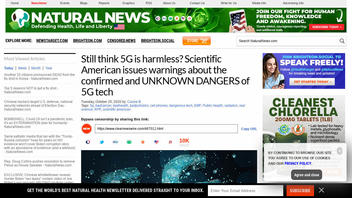
Did Scientific American warn that 5G technology is not safe? No, that's not true: That's the opinion of one guest columnist of many. The magazine has not taken a stand on the safety of 5G.
The claim appeared in an article published by Natural News on October 20, 2020, titled "Still think 5G is harmless? Scientific American issues warnings about the confirmed and UNKNOWN DANGERS of 5G tech" (archived here), which opened:
The oldest magazine in the United States, Scientific American, has issued a strong warning about the dangers of 5G technology. Their concerns about both the known and the potential dangers of 5G carry a lot of weight because the magazine is so influential and known for its rigorous scientific standards.
Users on social media only saw this title, description and thumbnail:
Still think 5G is harmless? Scientific American issues warnings about the confirmed and UNKNOWN DANGERS of 5G tech
The oldest magazine in the United States, Scientific American, has issued a strong warning about the dangers of 5G technology. Their concerns about both the known and the potential dangers of 5G carry a lot of weight because the magazine is so influential and known for its rigorous scientific standards.
In fact, no such warning came from Scientific American. Natural News' erroneously imputes to Scientific American the statements of a guest column that appeared in the October 17, 2019, issue of Scientific American. The column, titled "We Have No Reason To Believe 5G Is Safe," appears under the magazine's departmental logo of "Observations/Opinions" and states at the bottom:
The views expressed are those of the author(s) and are not necessarily those of Scientific American.
The column author, Joel M. Moskowitz, is not employed by Scientific American, which is made clear in an "About the author" note at the end of the piece:
Joel M. Moskowitz, PhD, is director of the Center for Family and Community Health in the School of Public Health at the University of California, Berkeley. He has been translating and disseminating the research on wireless radiation health effects since 2009 after he and his colleagues published a review paper that found long-term cell phone users were at greater risk of brain tumors.
Scientific American published the opposite opinion less than two weeks after the Moskowitz article, in an opinion piece titled "Don't Fall Prey to Scaremongering about 5G." That article, written by David Robert Grimes and published October 28, 2019, came to the exact opposite conclusion as Moskowitz's article.
The Scientific American author's note for Grimes states that he is "a cancer researcher, physicist, and John Maddox Prize-winning science writer. He is based at Dublin City University and is a visiting researcher at the University of Oxford."
As was the case with the Moskowitz article, the Grimes piece makes it clear it does not represent Scientific American's official view. The same disclaimer is printed at the end of Grimes' article:
The views expressed are those of the author(s) and are not necessarily those of Scientific American.
The issue of whether 5G is potentially harmful has been strongly debated.
Lead Stories has written several articles on claims concerning 5G technology. You can see some of them here, here, here, here and here.
NewsGuard, a company that uses trained journalist to rank the reliability of websites, describes naturalnews.com as:
A network of sites promoting both medical and non-medical conspiracy theories, particularly the false claim that vaccines are linked to autism.
According to NewsGuard the site does not maintain basic standards of accuracy and accountability. Read their full assessment here.

















